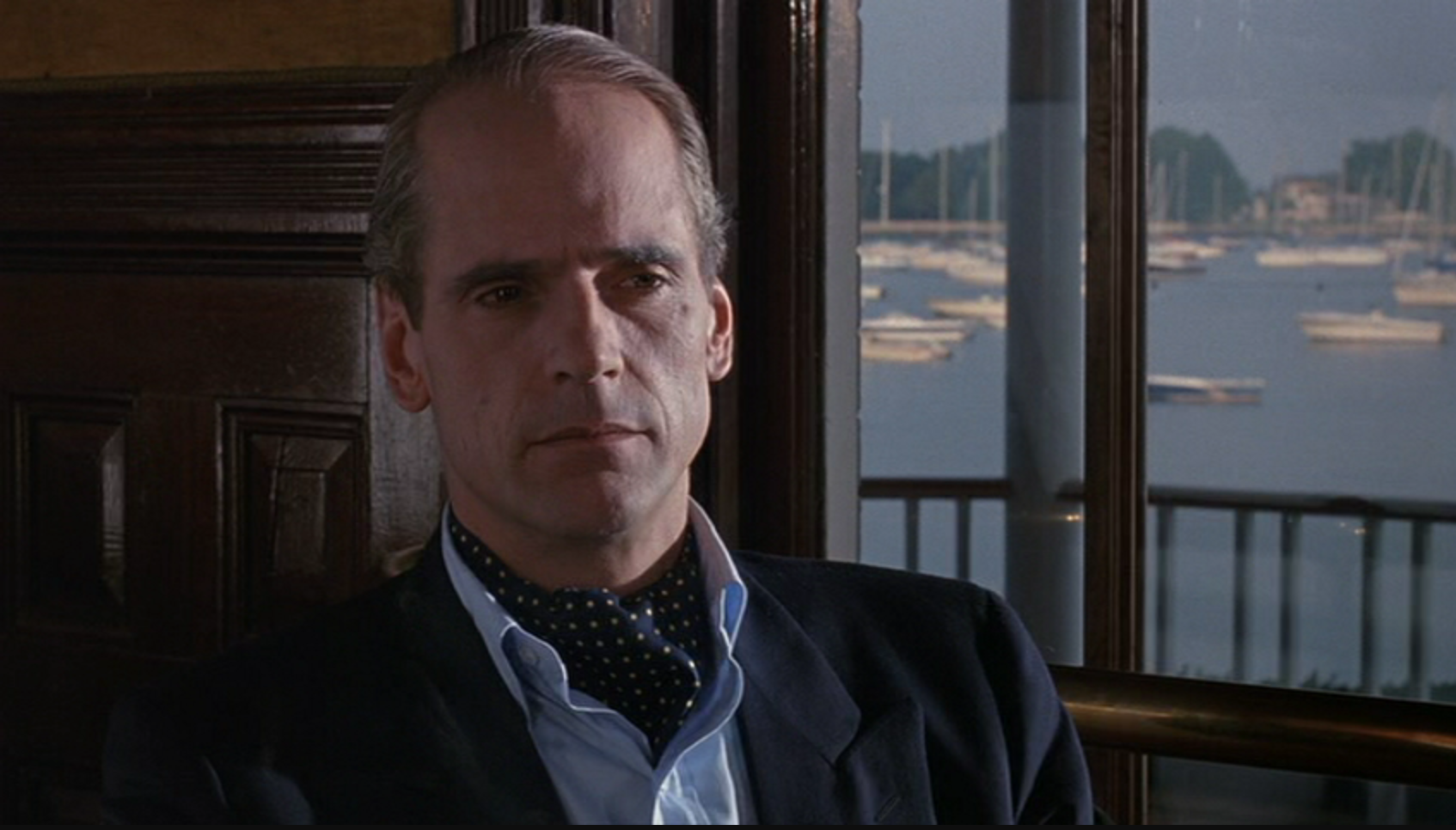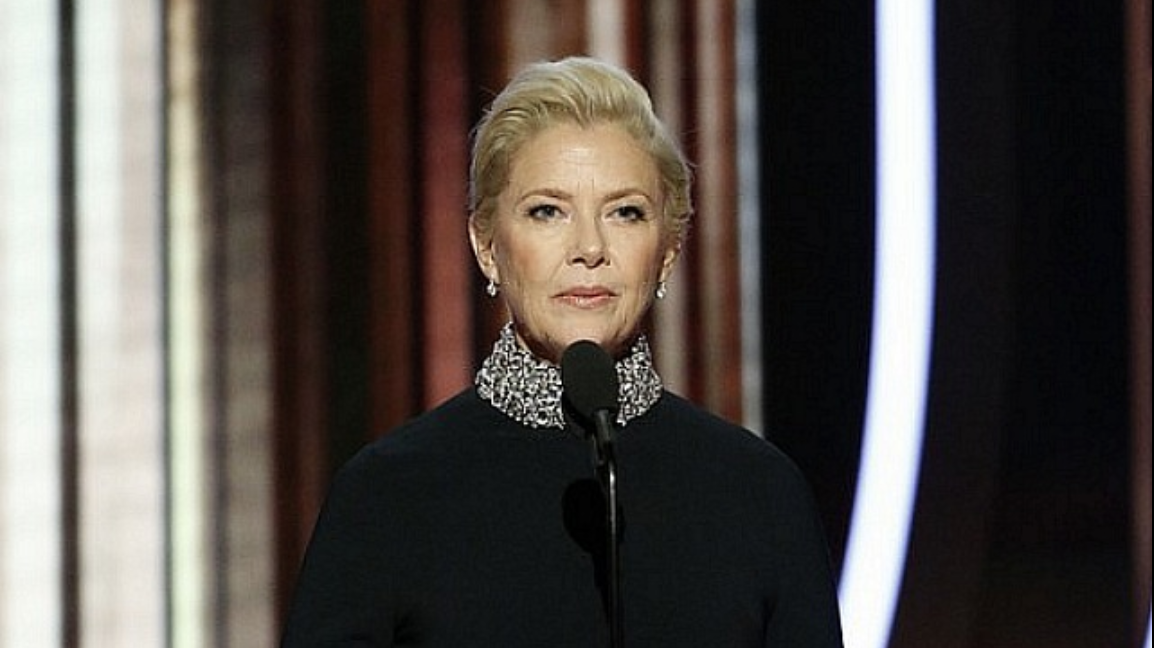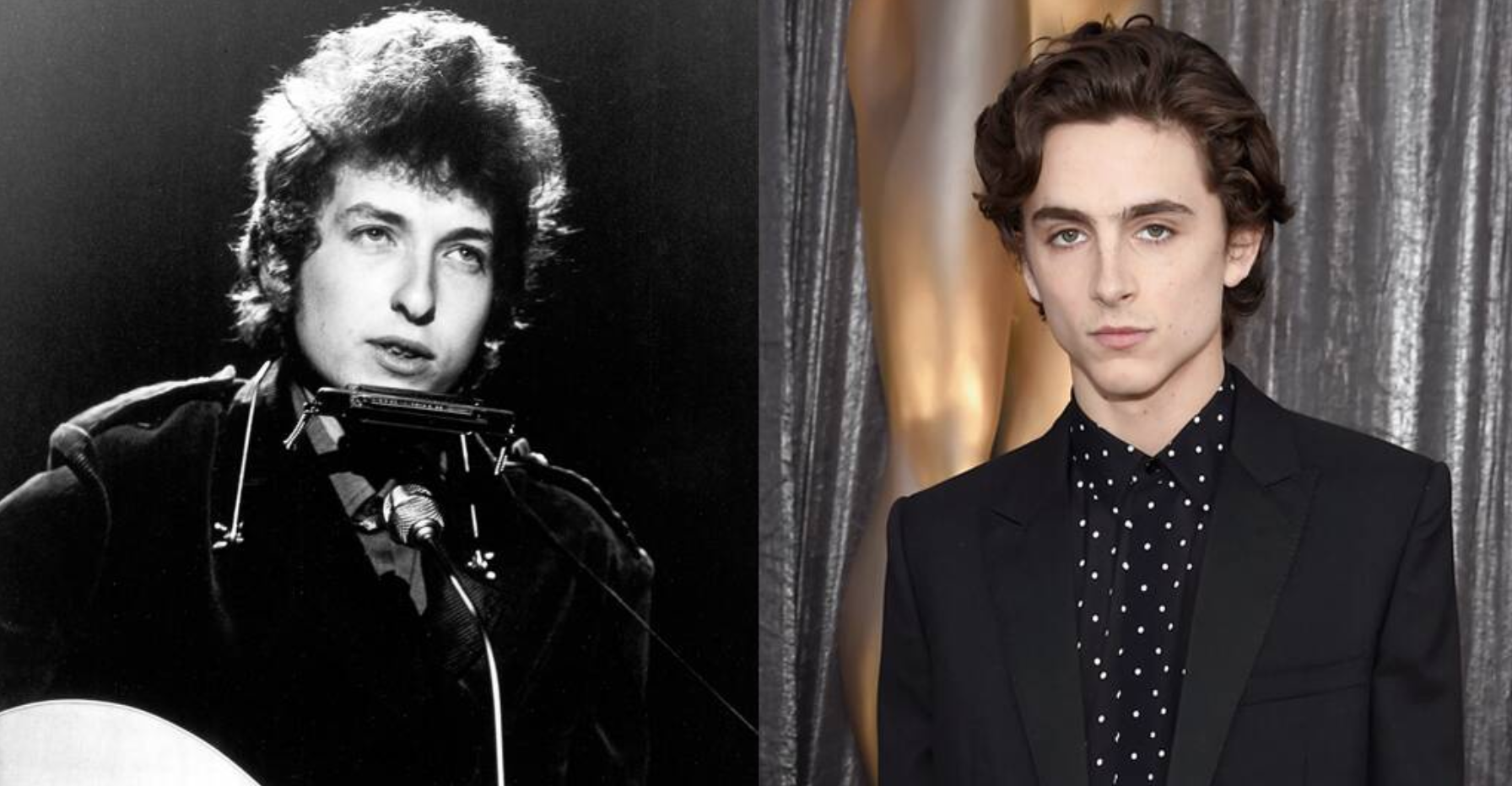Day: January 6, 2020
Re-Selecting 1990 Oscars
This is an old revisionist routine, but just for the record I thought I’d re-award some of the 1990 Oscars (i.e., the winners of the 63rd Academy Awards that aired on 2.13.91 or 29 damn years ago).
[Click through to full story on HE-plus]
On The Down Low
Annette Bening has said she’ll never have “work” done, but she looked so different last night during her Golden Globes appearance that my first thought was “hmmm, did she capitulate?” She looked radiant. Blonde, swept-back hair. A bit more slender than before. Just-right eye makeup. Definitely an upgrade of some kind or another. Getting a touch-up these days is nothing — it’s like coloring your hair or getting a facial. All to say that if Bening did go undergo a procedure, it’s fine.
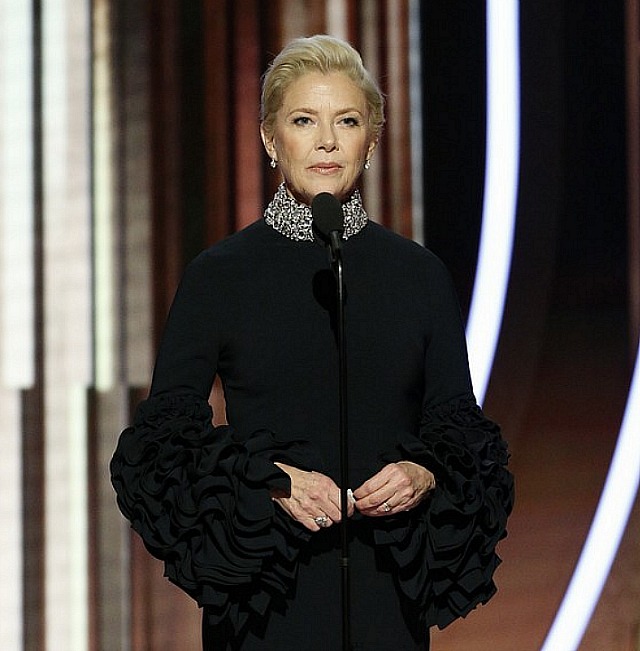
Chalamet as Dylan Getting Booed
Bob Dylan‘s changeover from acoustic folk to electric rock existential poetry (aka “electric Dylan controversy“) wasn’t just a major creative growth move on his part — it also wound up galvanizing rock music across the industry, inspiring the Beatles, Rolling Stones, the Byrds and many other to chime in with complex, socially relevant lyrics and musical attitudes. The shift began at the Newport Folk Festival in July ’65 (when Dylan was 24) and peaked with the infamous English booing tours (“Judas!”) of ’65 and ’66.
This chapter was totally covered in Martin Scorsese‘s Bob Dylan: No Direction Home, of course, but now James Mangold (Ford Ferrari, Walk The Line) is planning to direct the loosely-titled Going Electric, a Fox Searchlight film about this transitional period with none other than Timothee Chalamet as Dylan. Jay Cocks has written the screenplay; Dylan is actually exec producing.
I’d feel pretty good about this if I was Dylan, who believe it or not is around 14 months from hitting the big eight-oh. Chalamet is better looking than Dylan ever was, can act circles, can sing and probably plays guitar, and he’ll look the part when he grows out his Bringing It All Back Home Jewfro.
Better Chalamet, certainly, than Hayden Christensen, who played the Dylanesque “Billy Quinn” in George Hickenlooper‘s Factory Girl.
The Going Electric story was broken by Deadline‘s Mike Fleming.
Is J-Lo’s Oscar Campaign Finished?
Filed this afternoon by The Hollywood Reporter‘s Scott Feinberg: “Marriage Story‘s Laura Dern has long been the frontrunner for the Best Supporting Actress Oscar, but there was a sense that she might have a hard time beating Hustlers‘ Jennifer Lopez with the HFPA, which could have shaken things up overall. Dern has always been an HFPA fave — she was once Miss Golden Globe, and had four other Globe wins heading into the night — so she was not to be discounted.
“But the fact that J-Lo couldn’t win [last night] with the HFPA — a group that loves mega-stars so much it gave Lady Gaga a Globe for her acting on American Horror Story: Hotel — makes one seriously question if she can win anywhere.”
Outrage Campaign Bearing Fruit?
“Little Women has found an audience, and it’s selling tickets. But it breaks no sociopolitical ground, and men don’t like it.
“If it earns Oscar nominations, how are the filmmakers to know that they are the result of the movie’s excellence, not of the campaign conducted by angry white women in the prestige newspapers? Perhaps the film may suffer the lowest fate of all in the outrage economy: to be understood, principally, as a work of art.” — from “Little Women’s Real Feminist Problem” by The Atlantic‘s Caitlin Flanagan.
If you have any sporting blood in you, you have to acknowledge that the pushback campaign — “What to do about the guys who don’t want to see Little Women?” — seems to have been tactically effective, and that Greta Gerwig‘s film may end up with a Best Picture nomination after all. Who knows? Not because the film necessarily deserves it, but because enough Academy members have been agitated or guilt-tripped into voting for Little Women.
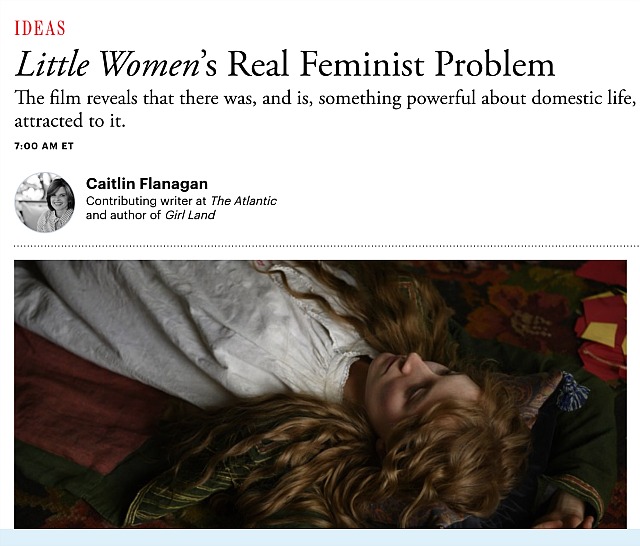
Wait A Minute…
From “What the Golden Globes mean for 1917, Once Upon a Time in Hollywood and the Oscars” by Michael Phillips, posted this morning: “If 1917 doesn’t win the top Oscar, Once Upon a Time in Hollywood will. It’s a statistical probability.”
Say what? Who says so? Because a majority of the Hollywood Foreign Press membership (about 90 people) voted that way? Phillips can’t just dismiss The Irishman with a wave of the hand. It’s a landmark film and a Scorsese gangster crescendo.
From Owen Gleiberman’s morning-after assessment in Variety:
“[Sam Mendes‘ film] hasn’t had a chance to get out there yet (it opens wide this coming weekend). And when it does, maybe a rousing reaction on the part of audiences will bolster its awards mojo. My feeling, however, is that 1917, with its look-ma-no-hands! one-shot gimmickry (please explain to me why this is more than a stunt), is a video game for fanboys posing as a drop-dead serious war movie. I think it would likely prove to be one of the most joylessly dutiful and uninspiring Oscar winners in memory. To me, seeing Mendes get up there instead of directors who made far more indelible (and celebrated) movies this year just didn’t feel right.”
HE to journo pally: “1917 is a respectable soulful tech thing — a ‘Ready Player World War I’ cake with emotional icing. It saves itself with the final scene with the brother, and I liked the symmetry of the beginning and ending of taking a nap against a tree.”
Journo pally responds: “The final scene does get to you, but I think in a mechanical/symmetrical and rather rote way. I don’t find it a truly stirring or awe-inspiring war film.”
Set A Spell
Raised-in-Russia Tatyana insists it’s uncouth to wear shoes in our home. Not doing so shows a lack of breeding and refinement.
“Okay”, I’ve replied, “but that’s exactly what I wasn’t taught by my middle-class, college-educated parents when I was a kid.” My dad would toss his loafers when he napped on the couch, but when people visited nobody followed suit…ever.
I was always told that only commoners sat around barefoot or with socks. The Beverly Hillbillies theme song ends with the singer saying “take your shoes off…set a spell,” etc. My earthy, Kentucky-born paternal grandfather used to say the same thing when we visited. I’m fairly certain that visitors to the Kennedy family compound in Hyannisport were never urged to do this.
To me shoe-wearing is more socially acceptable because well-heeled shoes are more attractive to look at. (Unless you’re wearing whitesides.) Who wants to look at someone’s knobby toes, covered or uncovered by gold-toe socks? Depending on who you’re with, feet can be extremely problematic. There’s nothing better to wear in someone’s living room that a pair of nice Bruno Magli lace-ups.
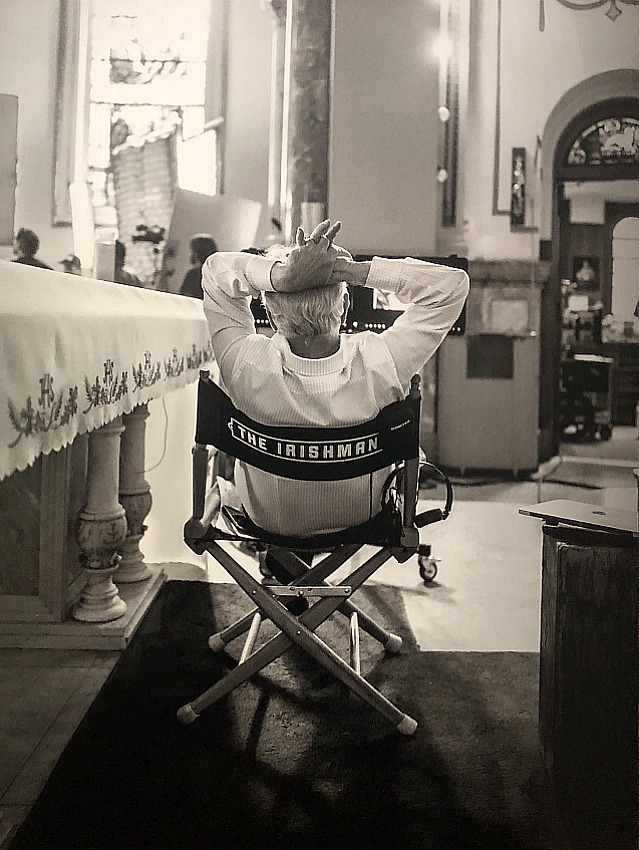
WGA Finals
The Writers Guild nominees have been announced, and yup, Sam Mendes and Krysty Wilson-Cairns‘ 1917 screenplay is among the Best Original Screenplay contenders. The other original script nommies are Rian Johnson‘s Knives Out, Bong Joon-ho and Han Jin Won‘s Parasite, Emily Halpern, Sarah Haskins, Susanna Fogel and Katie Silberman‘s Booksmart; and Noah Baumbach‘s Marriage Story.
Best adapted screenplay nommies are Joker, written by director Todd Phillips and Scott Silver (based on characters from DC Comics); Greta Gerwig‘s Little Women (based on the lore of Louisa May Alcott’s novel); Taika Watiti‘s JoJo Rabbit, based on Christine Leunens‘ “Caging Skies”; Micah Fitzerman-Blue and Noah Harpster‘s A Beautiful Day in the Neighborhood, partly based upon Tom Junod‘s article “Can You Say…Hero?”; and The Irishman, based on Charles Brandt‘s “I Heard You Paint Houses” and written by Steve Zaillian.
The 72nd annual WGA Awards are set for Saturday, 2.1 — two days after final Oscar balloting begins, and three days before it closes.
So What Happened?
Last night’s surprise awarding of two Golden Globes to 1917 — Best Motion Picture, Drama, and Best Director (Sam Mendes) — were not undeserved. Okay, amply deserved. 1917 is a knockout technical achievement that also delivers emotionally. The morning-after impression everyone seems to have is that this World War I epic (which Chicago Tribune critic Michael Phillips is calling “Ready Player World War I”) is now a serious Best Picture contender.
And yet we all understand, of course, that what happened last night was as much of an anti-Netflix thing as anything else. In other words, the Hollywood Foreign Press Association decided to once again express a familiar lament — i.e., how dare Netflix and other streaming companies conspire to destroy theatres by using omnipresent high-speed internet to deliver movies to customers?
Remember also that exhibitors were unrealistic and mule-stubborn in their pre-release dealings with Netflix over The Irishman, insisting on a 90-day theatrical window when everyone knows that 97% of movies are done in theatres after six weeks or 42 days. What would you have done if you were Netflix? Waited 90 days (or until sometime in mid January) to stream The Irishman?
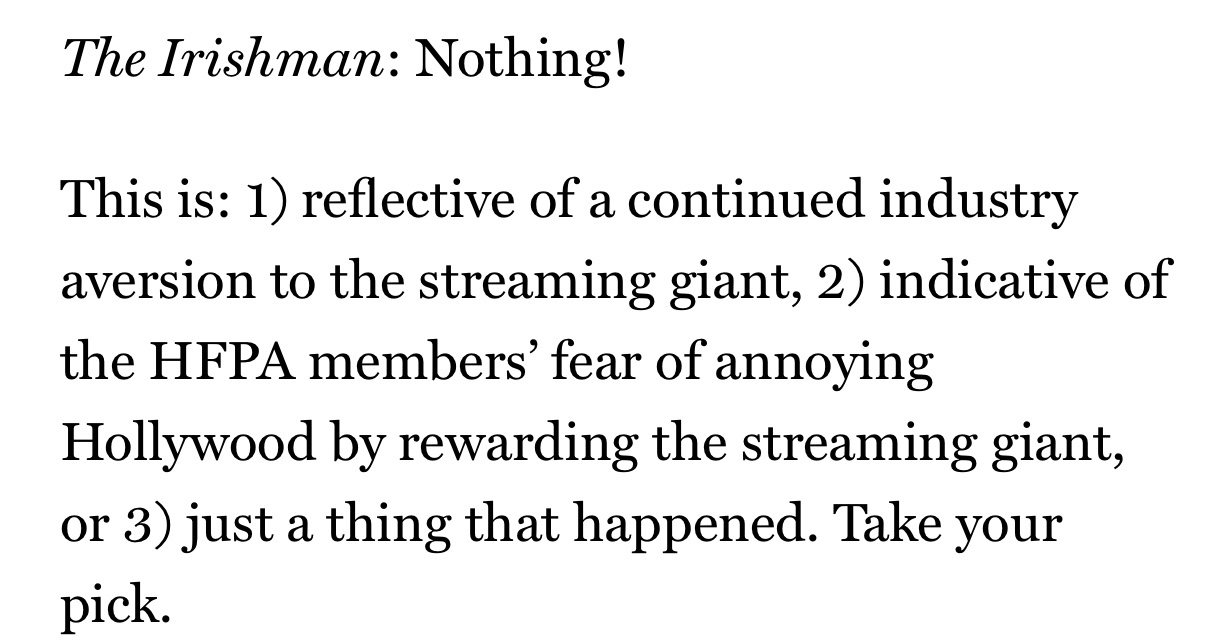
Post-Golden Globe Irish Rumination
The mark of a truly worthy and/or profound film is not about technical audacity or atmospheric authenticity (The Irishman‘s de-aging CG, the magical Birdman-like editing of 1917, Once Upon A Time‘s impressive period dressings), but how profoundly it connects.
In other words, what counts is whether the message or impression that it’s conveying “lands”, and how that makes you feel. It’s also about adding some kind of fresh-seeming insight to the subject and/or discussion at hand.
Which of the following Best Picture contenders sinks in the deepest? There’s only one answer.
1917 basically reminds that war is carnage and slaughter, but that compassion between solders endures regardless — something that The Big Parade, All Quiet on the Western Front and Paths of Glory said in their own eras and in their own ways.
Once Upon A Time in Hollywood essentially says that (a) in the late ’60s second-tier Hollywood types were the lifeblood of this town, (b) Zen-cool guys like Cliff Booth may be lacking in political skills but they sure are good to have around when the maniacs come calling, and (c) wouldn’t it be nice to spare a real-life beautiful actress in her late 20s from a horrible death, retroactively-speaking?
The Irishman conveys the paradoxical notion that gangsters can’t survive without ice water in their veins, but that this same ice water drains them of recognizable humanity and separates them from other human beings. (You could actually say the same thing about people in other professional arenas.) Martin Scorsese‘s film also reminds that old age is not for sissies, and no matter how you slice it the assaults and indignities of old age — canes, grape juice, white hair, wheelchairs, assisted living and death itself — aren’t that far off and are patiently waiting their turn.
I understand how those with little or no concept of mortality (i.e., Millennials and GenZs) can regard The Irishman at a distance. I also understand how there are some out there who are just too thick or insensitive to appreciate the kind of fine aged wine that The Irishman is pouring.
But there’s no disputing that The Irishman is essentially “Wild Strawberries with handguns” (as Anthony Lane called it a few weeks ago), and there are no other Best Picture contenders with Ingmar Bergman-esque tonalities or aspirations. Think about that.
Think also about the fact that only one award-season film is saying that we’re all going to die (not just a dangerously high percentage of soldiers on the battlefield or actresses with tragic destinies but every last one of us) and that before we push on maybe we should pay more attention to the things that really matter. I’m sorry but that strikes me as a more fundamental and valuable observation than anything else on the table.

